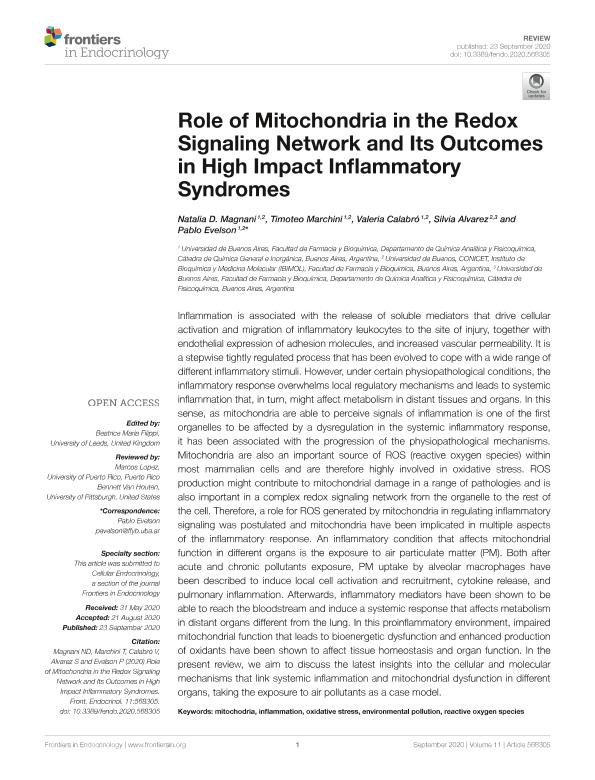Artículo
Role of Mitochondria in the Redox Signaling Network and Its Outcomes in High Impact Inflammatory Syndromes
Magnani, Natalia Daniela ; Marchini, Timoteo Oscar
; Marchini, Timoteo Oscar ; Calabró López, María Valeria
; Calabró López, María Valeria ; Alvarez, Silvia
; Alvarez, Silvia ; Evelson, Pablo Andrés
; Evelson, Pablo Andrés
 ; Marchini, Timoteo Oscar
; Marchini, Timoteo Oscar ; Calabró López, María Valeria
; Calabró López, María Valeria ; Alvarez, Silvia
; Alvarez, Silvia ; Evelson, Pablo Andrés
; Evelson, Pablo Andrés
Fecha de publicación:
09/2020
Editorial:
Frontiers Media S.A.
Revista:
Frontiers in Endocrinology
ISSN:
1664-2392
Idioma:
Inglés
Tipo de recurso:
Artículo publicado
Clasificación temática:
Resumen
Inflammation is associated with the release of soluble mediators that drive cellular activation and migration of inflammatory leukocytes to the site of injury, together with endothelial expression of adhesion molecules, and increased vascular permeability. It is a stepwise tightly regulated process that has been evolved to cope with a wide range of different inflammatory stimuli. However, under certain physiopathological conditions, the inflammatory response overwhelms local regulatory mechanisms and leads to systemic inflammation that, in turn, might affect metabolism in distant tissues and organs. In this sense, as mitochondria are able to perceive signals of inflammation is one of the first organelles to be affected by a dysregulation in the systemic inflammatory response, it has been associated with the progression of the physiopathological mechanisms. Mitochondria are also an important source of ROS (reactive oxygen species) within most mammalian cells and are therefore highly involved in oxidative stress. ROS production might contribute to mitochondrial damage in a range of pathologies and is also important in a complex redox signaling network from the organelle to the rest of the cell. Therefore, a role for ROS generated by mitochondria in regulating inflammatory signaling was postulated and mitochondria have been implicated in multiple aspects of the inflammatory response. An inflammatory condition that affects mitochondrial function in different organs is the exposure to air particulate matter (PM). Both after acute and chronic pollutants exposure, PM uptake by alveolar macrophages have been described to induce local cell activation and recruitment, cytokine release, and pulmonary inflammation. Afterwards, inflammatory mediators have been shown to be able to reach the bloodstream and induce a systemic response that affects metabolism in distant organs different from the lung. In this proinflammatory environment, impaired mitochondrial function that leads to bioenergetic dysfunction and enhanced production of oxidants have been shown to affect tissue homeostasis and organ function. In the present review, we aim to discuss the latest insights into the cellular and molecular mechanisms that link systemic inflammation and mitochondrial dysfunction in different organs, taking the exposure to air pollutants as a case model.
Archivos asociados
Licencia
Identificadores
Colecciones
Articulos(IBIMOL)
Articulos de INSTITUTO DE BIOQUIMICA Y MEDICINA MOLECULAR
Articulos de INSTITUTO DE BIOQUIMICA Y MEDICINA MOLECULAR
Citación
Magnani, Natalia Daniela; Marchini, Timoteo Oscar; Calabró López, María Valeria; Alvarez, Silvia; Evelson, Pablo Andrés; Role of Mitochondria in the Redox Signaling Network and Its Outcomes in High Impact Inflammatory Syndromes; Frontiers Media S.A.; Frontiers in Endocrinology; 11; 9-2020; 1-15
Compartir
Altmétricas



